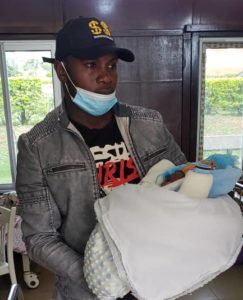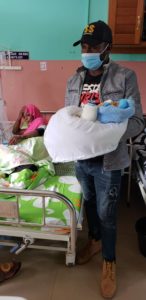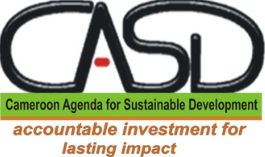 The onset of COVID-19 greatly affected individuals and families globally, nationally, and locally, especially their standards of living. The situation in Bamenda, North West Region of Cameroon became worse as the population is surviving an ongoing civil war which started in 2016. Many people lost their jobs to COVID-19 prevention measures, and others experienced a massive decrease in working upon the one-day per week ghost towns stipulated by the separatist moving fighting for the autonomy of the Anglophone region in Cameroon. This handicapped their ability to feed and acquire some basic commodities. This was the case of a good number of the Paternity Project beneficiaries, most of whom were of the informal sector and rely primarily on their day-to-day earnings.
The onset of COVID-19 greatly affected individuals and families globally, nationally, and locally, especially their standards of living. The situation in Bamenda, North West Region of Cameroon became worse as the population is surviving an ongoing civil war which started in 2016. Many people lost their jobs to COVID-19 prevention measures, and others experienced a massive decrease in working upon the one-day per week ghost towns stipulated by the separatist moving fighting for the autonomy of the Anglophone region in Cameroon. This handicapped their ability to feed and acquire some basic commodities. This was the case of a good number of the Paternity Project beneficiaries, most of whom were of the informal sector and rely primarily on their day-to-day earnings.
The paternity project has benefited 260 couples through the provision of life-saving maternal, newborn and child health education and long-term follow-up. The project mostly targets the husbands/boyfriends of pregnant adolescents and women whose pregnancy and birthing experience could be improved by simple compassion and care from these men. The beneficiaries are comprised of persons of different ages, professions, and living standards, including bike-riders, taxi-drivers, teachers, builders, students, hairdressers, seamstresses, uniform officers, businessmen/women, shoemakers, etc.
The COVID-19 Response grant of $3000, generously donated to CASD by the Global Force for Healing, provided:
- Food and nutritional supplementation for 116 pregnant women, breastfeeding mothers, and newborns (where exclusive breastfeeding is not feasible).
- Nutritional supplementation and psychosocial support for 35 adolescent girls living with HIV contracted at birth.
- 1000 locally made cotton/polythene face masks to pregnant women, breastfeeding mothers, adolescents living with HIV and members of their households.
- Communication, transportation, and meals expenses incurred by Julie Shu, the community health worker in charge of the project
The distribution exercise was done individually and in groups. Group meetings were encouraged for those living closer to the CASD office in Bamenda. As the families gathered, small symposiums were organized to enable them to interact, share best practices, and receive lectures on COVID-19. Topics treated include the impact of being a parent/would-be parent. Participants all shared their experiences; some reported being more responsible with regard to their financial expenditures given taking care of the newborn requires finances, and some explained they were busier than before as giving the pregnancy/baby the needed attention and catering to their needs was very time consuming, some men affirmed they were now more committed to their relationships, while some mothers/would-be mothers were concerned about their change in size (weight gain), others talked about missing employment opportunities due to their pregnancies and COVID-19. They all however rejoiced at being parents/would-be parents.
Participants all shared their experiences; some reported being more responsible with regard to their financial expenditures given taking care of the newborn requires finances, and some explained they were busier than before as giving the pregnancy/baby the needed attention and catering to their needs was very time consuming, some men affirmed they were now more committed to their relationships, while some mothers/would-be mothers were concerned about their change in size (weight gain), others talked about missing employment opportunities due to their pregnancies and COVID-19. They all however rejoiced at being parents/would-be parents.
The participants were enlightened on the fact that as parents/would-be parents, their lives will never be the same, and the need to invest in children and family planning. Ideas were shared on the topic “Women as catalysts of happy homes/families” with some of the best practices recorded being respect, forgiveness, cleanliness, and avoidance of nagging, among others. Lastly was a brief education on COVID-19, followed by questions and answers, distribution of the gifts, and taking of photographs.
A total of 33 beneficiaries attended the group sessions, and 83 attended the one-to-one sessions. They all greatly appreciated the gifts and much more the maternal and child health education and follow-up they had received. They also acknowledged how useful the knowledge gained was and continues to be. The men who accompanied their spouses also celebrate the paradigm shift in their approach to pregnancies and building prosperous homes.
